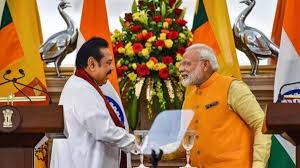World
Rajapaksa admits defeat, Modi hails Sirisena win

Colombo: Sri Lankan President Mahinda Rajapaksa Friday conceded defeat in the presidential election after officials indicated a landslide win for joint opposition candidate Maithripala Sirisena.
Stunned by the setback in an election he called two years ahead of schedule anticipating a win, Rajapaksa did not make any public comment but an aide said he had accepted defeat.
Rajakpaksa’s press officer said the president “concedes defeat and will ensure a smooth transition of power bowing to the wishes of the people”.
He said Rajapaksa had left his official residence and that the new leader of the island nation would be sworn in later Friday.
Official results will be known later Friday but Sirisena is expected to garner more than 50 percent of the over 11 million votes polled Thursday.
Indian Prime Minister Narendra Modi was among the first world leaders to congratulate Sirisena.
“I spoke to Sirisena and congratulated him. I congratulate the people of Sri Lanka on the peaceful and democratic poll process,” he said in a statement in New Delhi.
“As a close friend and neighbour, I reaffirmed India’s continued solidarity and support for Sri Lanka’s peace, development and prosperity,” Modi added.
US Secretary of State John Kerry also hailed Sirisena’s victory and said he looked forward to working with his government as it builds “a Sri Lanka that is peaceful, inclusive, democratic and prosperous”.
Sirisena was the health minister in Rajapaksa’s cabinet before he dramatically defected to the opposition in November. That undid whatever hopes Rajapaksa had of retaining the presidency for a third term.
Wild celebrations erupted all across capital Colombo as it became known that Rajapaksa, who took power in November 2005, had accepted defeat. Many burst firecrackers and danced on the streets.
Sirisena spearheded a spirited challenge against the president, blaming him for corruption and nepotism and for promoting family rule.
Sirisena attracted support not only from the Sinhalese, the country’s majority community, but also from minorities including Tamils and Muslims.
Voting was high all around the island Thursday, including in the Tamil areas where the LTTE once held sway until it was militarily crushed in 2009 and its leadership wiped out.
A former prime minister, Rajapaksa was first elected the president in 2005, defeating Ranil Wickremesinghe of the United National Party, and in 2010 when he defeated his former army chief Sarath Fonseka.
Fonseka was later jailed on charges of implicating the government in war crimes.
World
Lockdowns in China Force Urban Communities to Defy Censorship and Vent Frustration Online

Shanghai’s rich middle class is leading a wave of online dissent over the strict and prolonged lockdowns imposed in various parts of the country. Chinese internet censorship is struggling as patience is wearing thin in many urban centers, coming up with creative forms of online protests.
Social Media Posts Revealing Lockdown Tension in Shanghai
Drawn-out lockdowns are nothing new in China as authorities insist with the nation’s zero-Covid policy since the start of the pandemic. Currently over This time around, however, metropolitan areas like Shanghai are increasingly difficult to keep quiet, given that its more than 25 million residents have seen weeks of total isolation along with food shortages and many other service interruptions.
Dozens of towns and reportedly over 300 million Chinese citizens have been affected by lockdowns of different severity. As expected, urban netizens have been most outspoken over their difficulties by finding creative ways to get around state censorship and bans placed on topics, news comments and spontaneous campaigns.
Shanghai residents have been using mobile proxies and hijacking seemingly unrelated hashtags to talk about healthcare issues, delivery failures and the overall severity of their situation. The “positive energy” that the Chinese government wants to transmit during the recent prolonged series of lockdowns does not come naturally to those counting food supplies and online censors are working hard to filter words, trending topics and undesired social media sharing.
WeChat groups and message threads are under constant monitoring. Posts questioning the zero-Covid approach have been quickly deleted, including by leading Chinese health experts like Dr. Zhong Nanshan. Video footage is soon censored and protests and investigations are quickly made to disappear.
Where this has not worked, officials have exposed banners with warnings and outright threats like “watch your own mouth or face punishment”, while drones have been patrolling the city skies. Yet, if anything, this has led to further tensions and unspoken confrontation with Shanghai’s educated and affluent middle class.
Creative Online Solutions Harnessing Civic Energy
Announcements by Chinese social media that they would be publishing the IP addresses of users who “spread rumors” have not helped either. Tech industry research has shown that much of Asia’s tech-savvy population has a habit of using mobile proxies and other privacy tools, quickly finding workarounds to browse the internet freely and talk to the world about the hottest topics.
The sheer volume of forbidden posts is already a challenge for the very censorship system, experts explain. Unable to track all trending hashtags, state workers overlook topics that speak about the US, Ukraine or other popular news. Linking human rights elsewhere to their situation, Chinese online dissidents establish their informal channels and “hijack” the conversation to share personal or publicly relevant information about the Covid suppression in their town.
Sarcastic and satirical posts still dominate. Others hope to evade the censors by replacing words from famous poems or the national anthem. One thing is certain – social media, when harnessed with the right creativity, has proven its ability to mount pressure on the government in even some of the most strictly controlled tech environments like China.



















